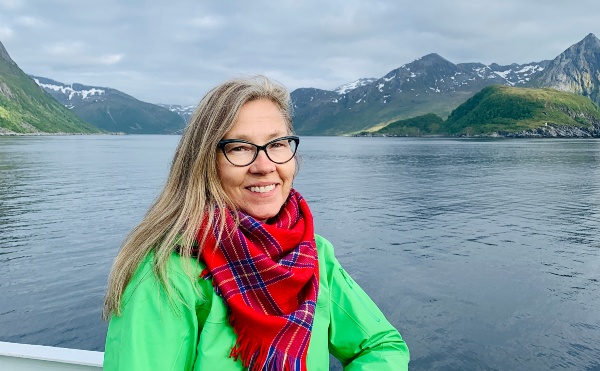
Bringing a voice to environmental concerns in the North
Susan Nerberg may live in Montreal, but she feels most at home when she is out in nature.
By Joanne Paulson for JSGS“Sometimes I say to my partner, ‘Can we just pitch the tent in the living room?' and I’m only half joking,” laughs Nerberg, who is a freelance magazine writer and a full-time student in the Johnson Shoyama Graduate School of Public Policy’s (JSGS) Joint Master of Governance and Entrepreneurship in Northern and Indigenous Areas (GENI) program.
Nerberg’s writing is focused on climate change, the environment, and people’s connection with the land. She has written stories that amplify Indigenous voices, but that also tap into a search for her own Indigenous roots.
Nerberg was born in Finspång, Sweden, an industrial town set amid forests and lakes, but has lived in Canada for more than half her life.
“My roots are on the Norwegian side of Sápmi, the traditional territory of the Sámi People on my father’s side, and in Finland on my mother’s side,” she says. “I’m Sámi on my father's side and that has in the recent past been a major preoccupation – to reclaim and decolonize.”
Nerberg originally came to Canada to become fluent in English, working first as a lab technologist in Toronto before switching careers and becoming a journalist in the 1990s.
Nerberg, who is fluent in a number of languages, says living in Canada is like being part of two worlds.
“I’m Indigenous, but I’m also a settler. Living here, I’m on someone else’s land. I wasn’t invited by Indigenous people to be here,” said Nerberg. “So, it is important for me to amplify Indigenous voices here because they have been excluded for so long, and still are, though that is changing.”
Nerberg says the GENI program is helping her build knowledge and skills on a professional and personal level.
“I love the landscapes of the north. I love how people have been able to thrive in such harsh climates for millennia,” she says.
“(The North) has obviously been more heavily impacted than other areas of the planet in terms of climate change. I wanted to understand more from governance and policy perspectives how decisions are made and how that affects or incorporates, or not, Indigenous ways of being and knowledge.”
On the personal side, Nerberg is exploring her own Sámi roots, which has a connection to the GENI program.
“I remember three or four years ago I was emailing with a woman who works with a group of museums in northern Norway and I was asking her about coastal Sámi cultures,” Nerberg says.
The person told her about the online JSGS program, and as Nerberg learned more about her own past, she decided to apply to the GENI program.
“A lot of it has been very useful to me as a journalist deepening my understanding of the north, but also to deepen my knowledge as a person who is trying to decolonize,” she said.
Nerberg intends to do her thesis on the coastal Sámi of northern Norway, in particular their knowledge of the marine environment of a particular fjord where, if a copper mine is allowed to open, the mine plans to dump the tailings in the sea.
She plans to go back in the summer and fall seasons to continue her academic and personal research.
Nerberg says there are many parallels between the Sámi and Indigenous peoples in Canada. The Sámi have been colonised for hundreds of years, she says, adding government policy up until the 1950s was for Sámi to assimilate.
“My grandmother was sent to a residential school and after that, she never wanted to speak her language again,” Nerberg says.
Her studies in the GENI program have allowed Nerberg to make connections with a wide range of people who are working in the north – from those involved in policymaking to Indigenous entrepreneurs.
“As a storyteller, it’s important for me to leverage their knowledge and expertise to bring stories about the north to people who don’t live there,” she says. “As Canadians, we often talk about being northern, but what does that mean? If you haven’t been in the north, it’s hard to get an idea of what it means to be in a remote place that is also a northern place.”
There are specific challenges, from accessing health care and education to having reliable Internet.
“It’s important for me to solidify my understanding if I’m going to write about northern and Arctic, as well as environmental and Indigenous issues,” she says. “I want to bring people there, to feel the place.”
Nerberg says she hopes to finish her masters by May 2024.
“I am getting a lot of ideas through this course,” Nerberg says.
“The guest speakers have been interesting and raise a lot of questions in my head,” she says. “I’m hoping it will lead to more work in and about the North.”

